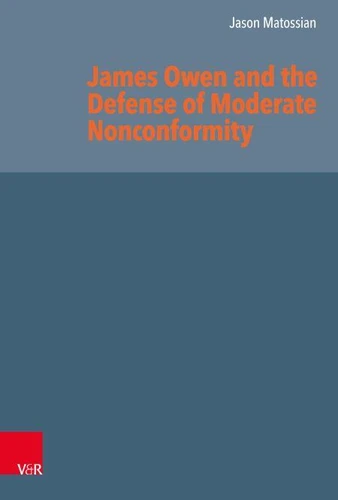James Owen and the Defense of Moderate Nonconformity
Par : ,Formats :
Disponible dans votre compte client Decitre ou Furet du Nord dès validation de votre commande. Le format PDF est :
- Compatible avec une lecture sur My Vivlio (smartphone, tablette, ordinateur)
- Compatible avec une lecture sur liseuses Vivlio
- Pour les liseuses autres que Vivlio, vous devez utiliser le logiciel Adobe Digital Edition. Non compatible avec la lecture sur les liseuses Kindle, Remarkable et Sony
 , qui est-ce ?
, qui est-ce ?Notre partenaire de plateforme de lecture numérique où vous retrouverez l'ensemble de vos ebooks gratuitement
Pour en savoir plus sur nos ebooks, consultez notre aide en ligne ici
- Nombre de pages166
- FormatPDF
- ISBN978-3-647-56048-9
- EAN9783647560489
- Date de parution17/01/2022
- Protection num.pas de protection
- Taille80 Mo
- Infos supplémentairespdf
- ÉditeurVandenhoeck & Ruprecht
Résumé
The period of Revolution and Toleration in England was filled with rapid change, political uncertainty, and ecclesiastical volatility. Still recovering from the strife of Civil War and a divisive Restoration, the relationship between the Church of England and Nonconformists remained deeply strained. Although Dissenters were granted the right to gather for worship under Toleration, their legitimacy was regularly challenged.
Within this context, a variety of significant controversies arose in which James Owen, a Welsh Presbyterian minister, played a prominent role and was a leading voice for moderate Nonconformity. Along with a group of moderate Nonconformist friends like Edmund Calamy, Philip and Matthew Henry, and Francis Tallents, Owen defended a version of Protestant ecumenism. This was a theological conviction that (1) the unity of the Protestant Church was indispensable and (2) this unity was to be found in agreement on essential doctrines, not in sharing ecclesiastical structures.
Owen, along with his associates, defended the Dissenters' separation from the Church of England as biblically sanctioned and at the same time emphasized that such separation was not schismatic. Owen's clear, biblically articulate, and historically informed writing made his contribution to the period of Toleration significant and influential.
Within this context, a variety of significant controversies arose in which James Owen, a Welsh Presbyterian minister, played a prominent role and was a leading voice for moderate Nonconformity. Along with a group of moderate Nonconformist friends like Edmund Calamy, Philip and Matthew Henry, and Francis Tallents, Owen defended a version of Protestant ecumenism. This was a theological conviction that (1) the unity of the Protestant Church was indispensable and (2) this unity was to be found in agreement on essential doctrines, not in sharing ecclesiastical structures.
Owen, along with his associates, defended the Dissenters' separation from the Church of England as biblically sanctioned and at the same time emphasized that such separation was not schismatic. Owen's clear, biblically articulate, and historically informed writing made his contribution to the period of Toleration significant and influential.
The period of Revolution and Toleration in England was filled with rapid change, political uncertainty, and ecclesiastical volatility. Still recovering from the strife of Civil War and a divisive Restoration, the relationship between the Church of England and Nonconformists remained deeply strained. Although Dissenters were granted the right to gather for worship under Toleration, their legitimacy was regularly challenged.
Within this context, a variety of significant controversies arose in which James Owen, a Welsh Presbyterian minister, played a prominent role and was a leading voice for moderate Nonconformity. Along with a group of moderate Nonconformist friends like Edmund Calamy, Philip and Matthew Henry, and Francis Tallents, Owen defended a version of Protestant ecumenism. This was a theological conviction that (1) the unity of the Protestant Church was indispensable and (2) this unity was to be found in agreement on essential doctrines, not in sharing ecclesiastical structures.
Owen, along with his associates, defended the Dissenters' separation from the Church of England as biblically sanctioned and at the same time emphasized that such separation was not schismatic. Owen's clear, biblically articulate, and historically informed writing made his contribution to the period of Toleration significant and influential.
Within this context, a variety of significant controversies arose in which James Owen, a Welsh Presbyterian minister, played a prominent role and was a leading voice for moderate Nonconformity. Along with a group of moderate Nonconformist friends like Edmund Calamy, Philip and Matthew Henry, and Francis Tallents, Owen defended a version of Protestant ecumenism. This was a theological conviction that (1) the unity of the Protestant Church was indispensable and (2) this unity was to be found in agreement on essential doctrines, not in sharing ecclesiastical structures.
Owen, along with his associates, defended the Dissenters' separation from the Church of England as biblically sanctioned and at the same time emphasized that such separation was not schismatic. Owen's clear, biblically articulate, and historically informed writing made his contribution to the period of Toleration significant and influential.



